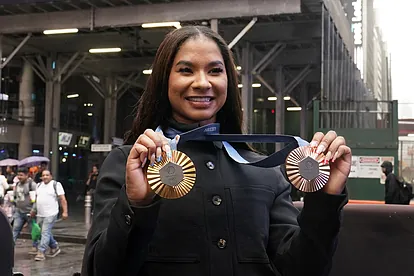As the 2024 Olympic Games conclude in Paris, a controversy has arisen over the final destination of one bronze medal, which remains unresolved. On Sunday, the International Olympic Committee (IOC) announced that American gymnast Jordan Chiles must return the bronze medal she won in the women’s floor exercise final. This decision was met with immediate resistance from the U.S. Olympic & Paralympic Committee (USOPC), which issued a statement declaring its intent to appeal the ruling.
“The USOPC will be appealing the recent decision made by the Court of Arbitration for Sport (CAS) regarding Jordan Chiles,” the organization said in a statement. “We firmly believe that Jordan rightfully earned the bronze medal, and there were critical errors in both the initial scoring by the International Gymnastics Federation (FIG) and the subsequent CAS appeal process that need to be addressed.”
The controversy began when Chiles originally scored a 13.666 in the floor final, placing her in fifth position. However, her coach, Cecile Landi, successfully appealed the gymnast’s difficulty score, raising it and boosting Chiles to third place with a score of 13.766, securing the bronze medal. Days later, the Romanian Federation of Gymnastics (RFG) filed a protest, alleging that Landi’s challenge was submitted after the one-minute time limit had expired.
After reviewing the case, both the FIG and CAS ruled in favor of the RFG on Saturday, resulting in Chiles’ score being reduced and her placement dropped back to fifth. Consequently, the IOC ordered Chiles to return her bronze medal on Sunday.
“The initial error occurred in the scoring by FIG, and the second error was during the CAS appeal process, where the USOPC was not given adequate time or notice to effectively challenge the decision,” the USOPC’s statement continued. “As a result, we were not properly represented or afforded the opportunity to present our case comprehensively.”
The USOPC remains steadfast in its support of Chiles and is committed to appealing the decision. “Given these circumstances, we are committed to pursuing an appeal to ensure that Jordan Chiles receives the recognition she deserves. We remain dedicated to supporting her as an Olympic champion and will continue to work diligently to resolve this matter swiftly and fairly.”
This case is reminiscent of past Olympic controversies where judging errors led to disputes over medals. Notably, in the 2002 Salt Lake City Winter Games, a French judge admitted to favoring a Russian figure skating pair, leading to a shared gold medal between the Canadian and Russian teams to resolve the scandal. Whether a similar resolution will be reached in Chiles’ case remains to be seen.
